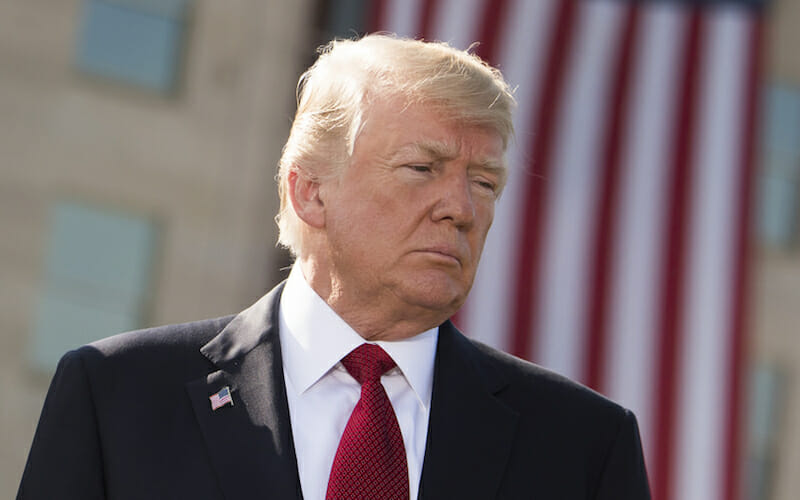
Trump’s Britain First Retweets Challenge Us to Fight his Fake News Habit
To justify the lofty title of “leader of the free world,” a president of the US should, by all rights, strive to be at the top of the hierarchy of political credibility. But under Donald Trump, that credibility has crashed to a nadir never seen in modern times. And now, just when it seemed he could hardly sink any lower, Trump has retweeted misleading and inaccurate anti-Muslim videos from the far-right fringe group Britain First.
Once again, he has lowered the bar for what can be expected from the White House, vaulting a loathsome hate group into the global debate in the process.
Coming from an enthusiastic proponent of the now dictionary-defined term “fake news,” Trump’s retweets are mind-bendingly paradoxical. Let’s assume for a moment that he truly believes everything he shares on social media – that he genuinely believes that the Muslim population of the US (and perhaps the world) poses a threat to national security. After all, this should be a safe assumption to make in reference to a person who retweets content from a group such as Britain First, whose leaders argue that the West is at war with Islam itself.
We must also assume then that Trump is blind to the irony of his retweets. By sharing unchecked content from such a deplorable source, he is playing into the hands of the same Islamist extremists he’s railing against.
Promoting disproportionate and unfounded generalised fear of an entire minority community is just the sort of scapegoating terrorists in general depend on. Their aim is to turn a populace so furiously against a minority group that that same group’s members start to act accordingly. Once this prophecy is fulfilled, it then becomes justification to elect and re-elect people like Trump.
Fortunately, there are things that can be done to break the cycle. And at the top of the list, the sceptical, informed public must reflect on its own role in this panic over terrorism.
Truth versus lies
While the media (and many people in high office) can be blamed for rash and often inaccurate reporting and dissemination of information, the public – now armed with an endless choice of information providers – has a much more active role in the generation of moral panics than at any other point in history.
We create our own information echo chambers on social media, which has fast become many people’s primary source of news. And to fight back against invidious behaviour like Trump’s, these echo chambers must be dismantled.
.@Theresa_May, don’t focus on me, focus on the destructive Radical Islamic Terrorism that is taking place within the United Kingdom. We are doing just fine!
— Donald J. Trump (@realDonaldTrump) November 30, 2017
There is no single easy way to do that. Not all echo chambers are the same. Some members of the public cannot tell the difference between legitimate information and fake news, while others simply just don’t care and are happy to see and disseminate anything, however dubious, that validates the views they already hold.
But there are also those who can see the obvious – that Trump doesn’t just use the term fake news, but embodies it; that he apparently cares little about terrorism itself and instead fixates on who is committing it. So what can be done?
Fighting back
One suggestion would be to orchestrate a mass unfollowing of Trump’s Twitter profile. That might at least pack some psychological punch; after all, narcissists cannot thrive if no-one listens. But even if all those who follow Trump but don’t support him unfollowed him, that would still leave at least a few million true supporters.
The Britain First incident throws up the possibility that the British government will cancel his as-yet-unscheduled state visit. But given that the expected fallout from Brexit compels the Conservative government to strengthen the special relationship, not strain it, that seems unlikely. The imperative to secure a new trade deal as soon as possible may, alas, come first.
Ultimately, those outside the US who are outraged and depressed by Trump’s effect on public discourse have little choice but to grit their teeth and hope the American electorate can right a wrong in the painfully distant 2020 election. Until then, we the people need to not let this kind of behaviour become acceptable or become the norm. The public must demand better than this from their elected leaders – and not succumb to the fear and bigotry that these videos are designed to spread.
And most importantly, we the people need to constantly challenge the fake news distribution from Mr. Fake News himself: the president of the United States.
This article was originally published on The Conversation. Read the original article.

